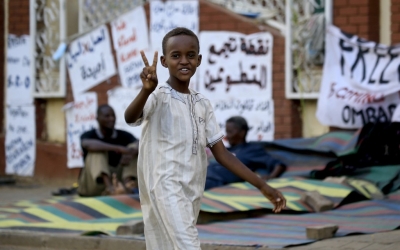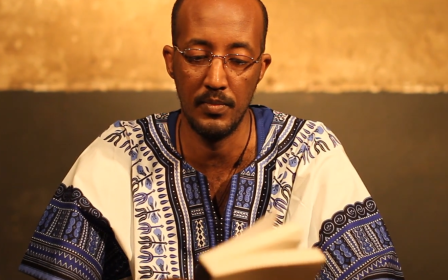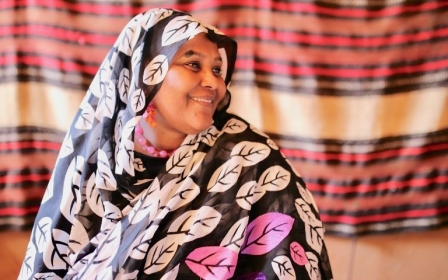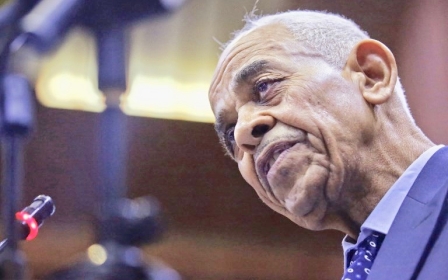Sudan unveils new cabinet as appeals court orders opposition leader's release from jail
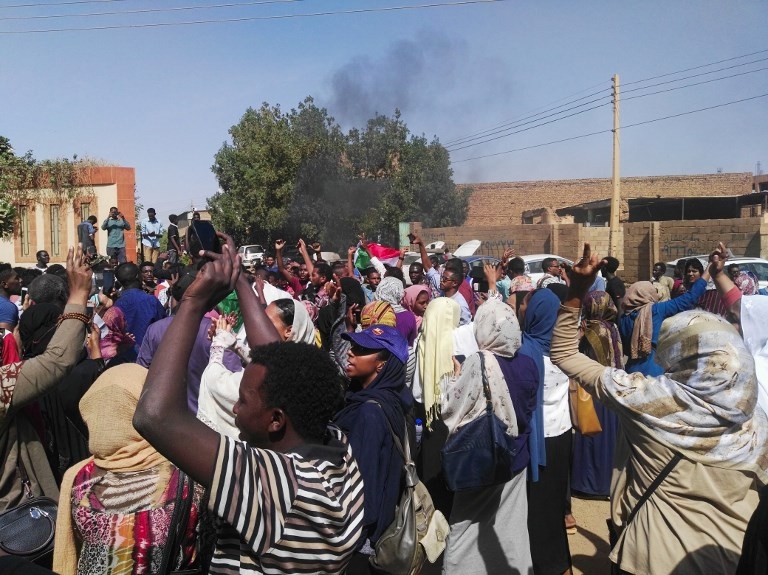
Sudan's new prime minister announced the formation of a 20-member cabinet as the government seeks to calm months of protests against President Omar al-Bashir's rule.
Unveiled on Wednesday, Mohamed Tahir Eila's cabinet will be tasked with solving an economic crisis that triggered anti-government rallies across the country and led to widespread calls for Bashir to resign.
The cabinet's 18 ministers are expected to be sworn in on Thursday.
The new government is the third to be formed in less than two years, with Bashir sacking two previous administrations for failing to revive Sudan's economy.
The protests erupted on 19 December after a government decision to triple the price of bread, but they have since expanded into a wider call for Bashir to step down.
Stay informed with MEE's newsletters
Sign up to get the latest alerts, insights and analysis, starting with Turkey Unpacked
The president dissolved his most recent cabinet along with all provincial governments on 22 February, when he imposed a nationwide state of emergency in an attempt to quell the demonstrations.
Why are Sudanese protesting against their government?
+ Show - HideSudanese protests have evolved in the space of less than six months from complaints about bread prices to calls for long-term leader Omar al-Bashir to go and demands for a civilian-led transition to democracy.
Here's a summary of the key moments so far since the protests began.
19 December 2018: People take to the streets in the city of Atbara to protest against a government decision to triple the price of bread, torching a local ruling party office. By the next day protesters on the streets of Khartoum and other cities calling for "freedom, peace, justice". Police try to disperse the crowds, resulting in at least eight deaths. Dozens more will be killed in the weeks of protest that follow
22 February 2019: Sudanese President Omar al-Bashir declares a nationwide state of emergency. He swears in a new prime minister two days later, as riot police confront hundreds of protesters calling for him to resign
6 April: Thousands gather outside the army's headquarters in Khartoum, chanting "one army, one people" in a plea for the military's support. They defy attempts by state security forces to dislodge them and troops intervene to protect them
11 April: Military authorities announce they have removed Bashir and that a transitional military council will govern for two years. Despite celebrations at Bashir's demise, protest leaders denounce the move as a "coup" and the protesters remain camped outside army headquarters.
14 April: Protest leaders call on the military council to transfer power to a civilian government
20 April: Sudan's military rulers hold a first round of talks with protest leaders
27 April: The two sides agree to establish a joint civilian-military ruling council, but talks stall over differences in the composition of the council, with both sides demanding a a majority
15 May: With negotiators reported to be close to agreeing a three-year transition to civilian rule, military leaders suspend talks and insist protesters remove barricades outside the army's headquarters. Talks resume on 19 May but break down again on 20 May, with the opposition insistent that a civilian must head the transitional governing body
28 May: Thousands of workers begin a two-day strike to pressure the military rulers and call for civilian government
3 June: At least 35 people killed and hundreds injured, according to opposition-aligned doctors, as security forces firing live ammunition move to disperse the protest camp outside army headquarters
4 June: General Abdel Fattah al-Burhan, the head of the military council, announces that all previous agreements with protest leaders are scrapped and says elections will be held in nine months
Eila, who was sworn in as prime minister on 24 February, said his new government, which retains several ministers from the previous cabinet, aims to tackle the country's economic crisis, AFP reported.
Changes included the ministers of petroleum, finance and the interior, Sudan's state-run SUNA news agency was cited by Reuters as saying.
"We recognise the main issues, the issues of bread and oil, that need to be solved," Eila told reporters as he announced the names of his ministers, AFP said.
"The economic issues need to be solved immediately as it impacts inflation and our currency rate," Eila said.
Opposition protests and arrests
The prime minister's announcement coincided with a Sudanese appeals court's order on Wednesday to release Mariam al-Mahdi, deputy chief of the country's main opposition National Umma Party, AFP also reported.
An emergency court on Sunday had sentenced al-Mahdi to one week in jail after security agents arrested her at an anti-government protest.
"The appeals court freed Mariam and she is now at home," her sister Rabah told AFP.
Al-Mahdi's detention comes amid a wave of arrests of anti-government protesters, many of whom have been sentenced in special courts set up after Bashir's state of emergency decree.
On 9 March, nine women protesters were sentenced to 20 lashes each, a day after a presidential decree to mark International Women's Day ordered the release of 150 women protesters from prison.
Officials say 31 people have died in protest-related violence so far, while Human Rights Watch has said that at least 51 people, including medics and children, have died.
Although the bread price rise triggered the protests, anger had mounted across the country for years over soaring inflation and an acute shortage of foreign currency.
For his part, Bashir has blamed the protests on outside forces seeking to sow discontent in Sudan. He has repeatedly urged citizens to seek political change through the ballot box, not on the streets.
Protesters have continued to hold rallies, however, in defiance of the president, with anti-government demonstrations still taking place in parts of the capital Khartoum and its sister city, Omdurman.
Faced with ongoing protests, the Sudanese authorities earlier this week reduced the duration of the countrywide state of emergency from one year to six months.
Middle East Eye delivers independent and unrivalled coverage and analysis of the Middle East, North Africa and beyond. To learn more about republishing this content and the associated fees, please fill out this form. More about MEE can be found here.


